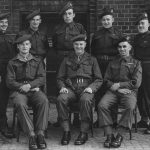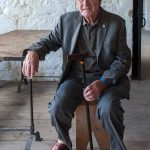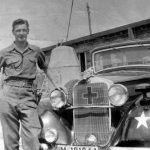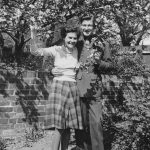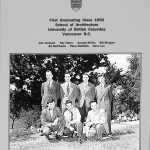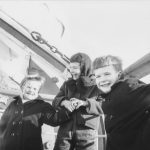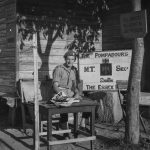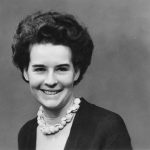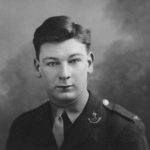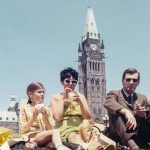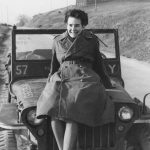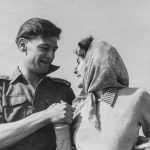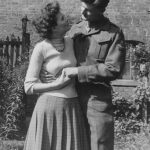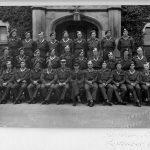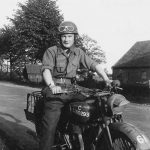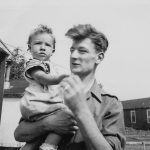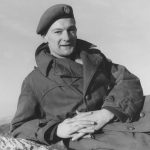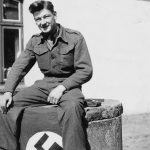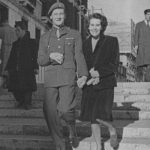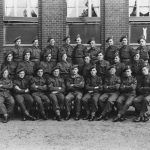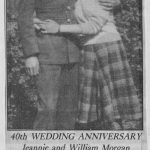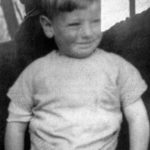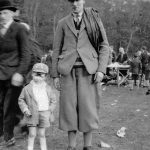Bill Morgan was born April 23, 1925 in Consett, England, a small city on the east coast, not too far from Newcastle. Bill’s mother passed away when he was just five, and at that time he moved in with his grandparents and aunts, and his father’s role in his life diminished. Bill grew up an only child, working alongside his grandfather in the family sign business and attending the Consett Technical School, all in the shadow of the city’s great ironworks. At age 16 Bill was off to university, ready to study architecture at King’s College in Newcastle. The war was underway at this point, and during the Blitz Bill was doing duty as a fire watcher in Newcastle, and as dire as things were in the south of the country, Bill recalls that life in the north was going on much as before. Even the declaration of war did not capture his attention to a great degree; it was only Dunkirk that alerted him and his friends to the emerging danger. He and some friends made the decision to join the Officer Training Corps at King’s College, and they awaited their turn to be brought into the war. His friends were accepted by the Royal Marines, but Bill did not pass that medical. Undeterred, he continued to press and he made his way into the Durham Light Infantry, and the regimen of training began for the young officer to be. Along the way, he met a young woman by the name of Jeanie, and a whirlwind wartime romance began. The two married and had a three-day honeymoon in Edinburgh, and Bill was off to the continent. When he arrived in February 1945, Allied forces had just reached the Rhine. Bill by this time had been assigned to the Cameronians, and they crossed the Rhine, and the British drove towards and took Bremen. Bill led his platoon through a number of battles at this time, and was in Germany when VE Day took place. From there they were briefly returned to Belgium and a short leave to see their loved ones, and then transferred to the Essex Regiment, Bill became part of the Army of Occupation. Bill was assigned to Berlin and Magdeburg and then sent to Italy, by which time Jeanie had joined him on the continent, living mainly in Trieste and Venice. The young couple returned to England in 1947, when Bill was demobilized and he returned to his architectural studies. Baby Nicola came shortly after that, and Bill and Jeanie decided to move to Canada for a new start. Bill entered an architecture program at UBC, and when he completed his studies he took work at an engineering firm. It was not to his liking though, so he returned to a life in uniform, joining the RCAF as a flying officer; it turns out the RCAF was in the midst of a massive Cold War era expansion, and they needed facilities and therefore an architect. The family relocated to Ottawa, and from there returned to Europe, this time to Paris and England, where Bill worked on developing the NATO bases that were being constructed in France, Germany and England. A transfer to Canada happened in the late 50s, and Bill continued his military career, building USAF/SAC refueling bases and satellite defence installations in northern Canada, followed by four years of major NDHQ design work in Ottawa. In 1968 Bill departed from military service with the rank of Wing Commander. All the while the family grew to four children by this time. Continuing to work, Bill was appointed Director of Public Works for the Government of the Northwest Territories, located in Yellowknife NWT. 1978 saw retirement from Public Service and engagement in Consultant Architectural work, for a further 6 years, first with DND in Germany, and then the R.C. School Board in Ottawa. After final retirement, he and Jeanie first settled in Ottawa, then in Penticton B.C., and then back to Ottawa where Jeanie passed away in 1995, the year of their 50th Wedding Anniversary. Bill has since settled into his own rhythms, connecting with family and here connecting with his own history. The impetus for this interview came from Bill’s daughter Lisa, who wanted to document the family history, and who had become aware of the oral history endeavours of Eric Brunt and Scott Masters. Further assistance and crucial technical support work came from Bill’s son Andrew, who connected us and provided numerous photographs and documents. This interview between Bill Morgan and Scott Masters took place over two sessions on zoom in June 2020, during the Covid-19 pandemic.
Videos
Click next video below to keep watching
- 1. William Morgan - Introduction
- 2. Consett Junior School
- 3. School, Religion and the Great War
- 4. Leaving Home
- 5. Chamberlain, Churchill, and Dunkirk
- 6. Motivations
- 7. Training
- 8. February 1945
- 9. Arrival in Oostende; Delmenhorst
- 10. Taking Prisoners
- 11. The Advance across the Field
- 12. Weather and Day-to-Day Conditions; Loss
- 13. Civilians
- 14. May 8
- 15. Magdeburg
- 16. From Germany to Italy
- 17. England, and Canada
- 18. Family; Back to England
- 19. Return to Canada
- 20. Cold War Fears
- 21. Ottawa and Yellowknife
- 22. Ottawa Again; Retirement
- 23. Looking Back
- 24. Looking Back, continued
